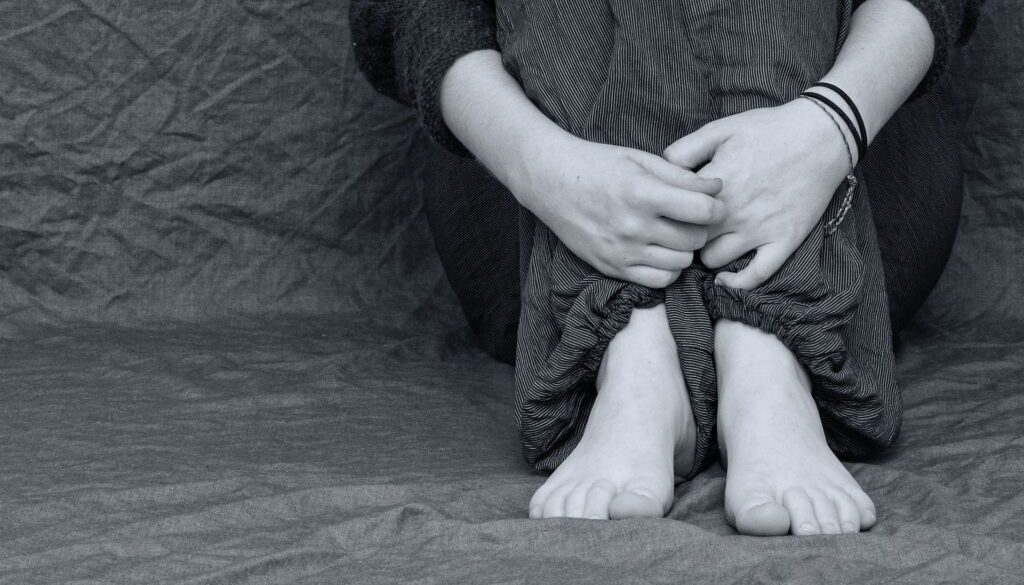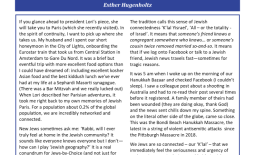A People Fearful and Vulnerable
The images are such stark ones that they have become a staple of our culture. The Golden Calf, the shattered tablets, a people oscillating between orgies of elation and crises of despair. Fury, rage, disappointment, reconciliation. Language of sin and repentance, of retribution undone by grace.
This could easily be a sermon about the idolatries we commit. As individuals and as a society. We could dwell on the Golden Calfs in our own life; our warped sense of priority, our addiction to the fragment rather our perception of the whole. Our passion for power rather than our devotion to truth. As true and relevant as these teachings are, it is not what I want to focus on this Shabbat. Instead, I want us to focus on the collective psychology of the Israelite nation as well as the psychology of God and Moses and what we can learn from this.
In a passage of lesser drama than what precedes and follows it, God and Moses engage in a startling dialogue upon seeing the people worship the Golden Calf.
‘The Eternal further said to Moses, “I see that this is a stiffnecked people. Now, let Me be, that My anger may blaze forth against them and that I may destroy them, and make of you a great nation.”
It is clear that God is on the cusp of annihilating the Israelite nation in the face of their intense and seemingly incomprehensible betrayal. From several narratives in the Torah, we know that God does not shy away from the prospect of utter destruction. We saw this in the generation of the Flood and we saw this at Sodom and Gomorrah. Our tradition has long wrestled with the implications of these stories, heralding Noach as sufficiently righteous but not righteous enough to overturn God’s verdict, and heralding Abraham as both righteous and brave enough to stand in the breach and challenge God, even if the outcome was a failure. This seems to be a third time. This time, it is Moses who witnesses God’s exasperation with the vicissitudes of human nature. The generation of the wilderness are a ‘stiffnecked people’, ‘am k’she oref’ and have earned divine retribution for their transgression. In fact, God is so incensed that the threat of complete annihilation looms large; God would destroy the Israelites and lift up Moses as a new Noach or Abraham and place upon him a new covenant.
It is a horrifying image. To be frank, it is a genocidal image. Thankfully, Moses follows the example of Abraham rather than Noach and challenges God. The Torah continues:
“But Moses implored the Eternal his God, saying, “Let not Your anger, O Lord, blaze forth against Your people, whom You delivered from the land of Egypt with great power and with a mighty hand. Let not the Egyptians say, ‘It was with evil intent that He delivered them, only to kill them off in the mountains and annihilate them from the face of the earth.’
This is a remarkable passage with a surprising argument. We usually read this from the perspective of Moses, a topnotch negotiator. Moses flatters and cajoles God. What will other nations say if God takes out this people only to abandon and kill them in the desert, like a capricious and abusive husband? It is expected to read this text from the perspective of Moses’ psychological astuteness. But what if we read this text from a perspective of collective trauma? Perhaps this text is less about Moses and God and more about the people themselves. A people threatened with destruction several times over; a people weakened and tired, scared and vulnerable, fearful of their identity and continuity. It begs the question what it is like to live under the shadow of annihilation; a question, unfortunately, that the Jewish people would answer with their lives many times over through our history.
Maybe Moses is not imploring God on the merit of a clever argument; maybe Moses is reflecting the genuine fear that the people had: to die out, to cease to be, in this bleak and all-consuming wilderness. To be uprooted, without place, time and belonging. To be both lost and forgotten, a footnote among the annals of history.
It is a very existential fear and an understandable fear.
Today is Refugee Shabbat. Part of me considered bringing you facts and data about the status of the world’s refugees. To share with you how people suffer and the circumstances they find themselves in. Instead, I have chosen to follow the injunction of the Torah to truly know the ‘nefesh’, the soul, of the stranger, immigrant or refugee. This is the ‘nefesh’ that becomes apparent in Moses’ discourse with the Eternal. To be a refugee is to be a stolen soul; robbed of one’s fundamental place of belonging in the world; to worry about one’s extinction, if you will. To be pulled out of context and dragged into the wilderness with a profound unknowing where the path would lead. To be a refugee is to be, in many ways, utterly alone in the world. To be a refugee is to have no champion speak for you, no institution represent you, to be utterly and completely at the whim and will of others.
Throughout this year, many of us have been forced to encounter an element of this harrowing experience. It is not my place to say to what degree or in what way. We can all search our own nefesh and find the solitude and fear in it. Some of us have considerable privilege, others do not. But we have all experienced alienation to a degree that we have felt the pang of exile deep inside us among the shifting tectonics of our pandemic world. It is clear that the only moral response to this is unabating love, kindness and solidarity. To truly know the ‘nefesh’ of the stranger, we too must reckon with our deepest fears. These fears need not be catalysts for bigotry but motivations for expansive love. Our trauma can be turned into another’s healing. Through our experience, we can offer belonging in the world.
The Torah’s dialogue continues in a stunning way, pivoting in unexpected beauty.
“Turn from Your blazing anger, and renounce the plan to punish your people. Remember Your servants, Abraham, Isaac, and Israel, how You swore to them by Your Self and said to them: I will make your offspring as numerous as the stars of heaven, and I will give to your offspring this whole land of which I spoke, to possess for ever.” And the Eternal renounced the punishment He had planned to bring upon His people.” (Ex. 32:9-14)”
Moses reminds God of God’s own obligations; of this God, Who later in the Book of Deuteronomy, would state that God is the ‘shomer gerim’, the Guardian of Strangers, the Protector of Immigrants and Refugees. But in this instant, God needs to be reminded – and God is. As stated in Psalms, God is the One who ‘heals the brokenhearted, binds up their wounds, counts the stars and gives each one a name.’
It seems strange that Moses needs to teach God, but it is oh so fitting with what we know about the depths of the soul. We, too, need to be reminded of mercy and love, grace and compassion. We need to be reminded of the ties that bind us to the human family; the cords of love that connect you to me and all of us to each other, stranger and citizen alike.
May the compassion and understanding that comes from this help us renounce the cruelties of our world and make God’s world and ours, a home of belonging and safety for all of us. For that, truly, is where greatness can be found.



